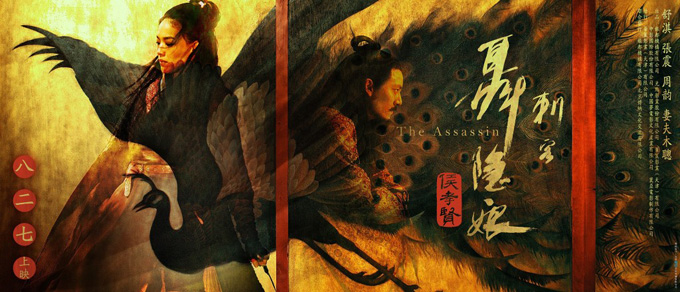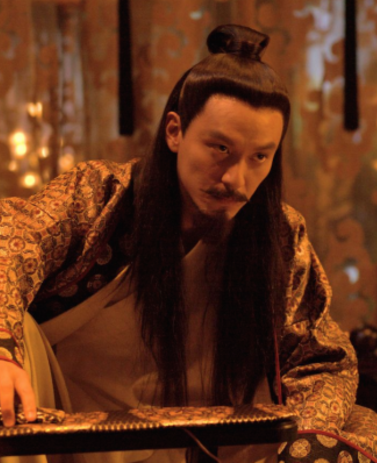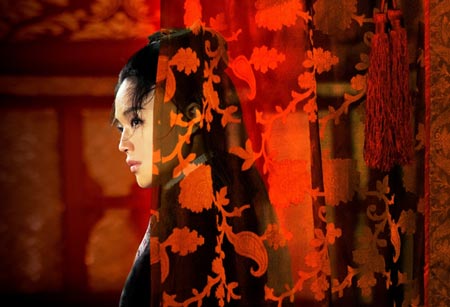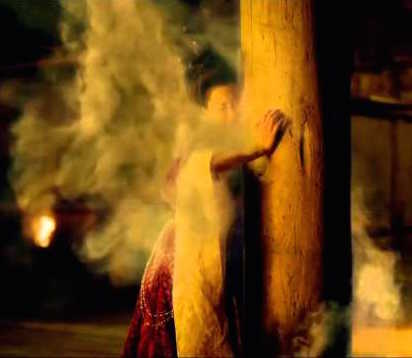Nathaniel returning to life, albeit to watch a film about someone who ends it, on the closing weekend of the 53rd New York Film Festival
If you believe in cinema as a reflection of reality then every college should offer at least undergraduate courses in Becoming an Assassin because that profession is always hiring! According to the movies, there are more assassins in the world than accountants. Full disclosure: I'm no fan of this overflowing subgenre. Assassin movies, like their counterparts Gangster Dramas and Serial Killer Thrillers, often glorify death-dealing or at least cast their protagonists as noble "anti-heroes" or admirably gifted / committed to their criminal art. [More...]
 Shu Qi, Chang Chen, and Hou Hsaio Hsien reunite for "The Assassin"
Shu Qi, Chang Chen, and Hou Hsaio Hsien reunite for "The Assassin"
So it was somewhat refreshing to see a movie about an assassin who possibly shares common-sense distaste for the profession. The biggest surprise, and one that comes quite early in Hou Hsiao Hsien's The Assassin, is that the beautiful Yinniang (Shu Qi) doesn't seem to reap any satisfaction from her job. The black and white prologue is her graduation of sorts and when it's over she's not exactly throwing her cap in the air with glee. No one throws her a party.
 Chang Chen as Tian Ji'anThe set up for the film's main story, goes like so: After Yinniang refuses to kill her first post-graduation target, her master the Nun Princess* (Sheu Fang-yi) proclaims that though Yinniang has no peers with the blade she lacks resolve and heart for her duties. As punishment (?) she is then sent home to her family with the command to kill her own estranged cousin Tian Ji'an (Chang Chen), who rules the district of Weibo**. That's the first twelve minutes.
Chang Chen as Tian Ji'anThe set up for the film's main story, goes like so: After Yinniang refuses to kill her first post-graduation target, her master the Nun Princess* (Sheu Fang-yi) proclaims that though Yinniang has no peers with the blade she lacks resolve and heart for her duties. As punishment (?) she is then sent home to her family with the command to kill her own estranged cousin Tian Ji'an (Chang Chen), who rules the district of Weibo**. That's the first twelve minutes.
I couldn't exactly summarize the next ninety-five even if I wanted to.
It's both amusing and eye-catching when this motion picture shifts to color and a different aspect ratio takes over during some virtuosic string instrumentation back in Weibo. (Dolan and Anderson aren't the only auteurs purposefully funking up their aspect ratios mid-movie). I can't even tell you who is playing the string instrument so aggressively in the aforementioned transitional sequence as we aren't introduced properly. Thinking back, it was probably either Yinniang's mother***, T'ian Jian's wife (Zhou Yun), or T'ian Jian's mistress (Nikki Hsin-Ying Hsieh). Those are three different characters, of course ****, but the movie nearly always skips past introductions and connective tissue when you most need it though a second viewing would surely clear things up as the movie isn't entirely opaque.
This information withholding isn't purposefully cruel or incompetent as storytelling goes. Hou is merely disinterested in it... not unlike Yinniang herself when it comes to killing. Thus the remainder of the movie becomes an exercizing in oohing and aahing over its rather mesmerizing visuals, which if you've ever seen a Hou movie may well be recommendation enough. The plot points, when they arrive, are as easy to miss until after they've hit you as the swift cuts from Yinniang's memorably curved dagger. The film's most traditionally satisfying popcorn moment, funny and exciting and story-related, actual combines the pieces of my analogy right there by dropping a soap opera plot point reveal into the sole line of dialogue (just three words) in the middle of a swordfight between the movie stars.

If the story were just confusing, that would be fine. Movies are more than their narrative after all, particularly when they're crafted with such skill. The costumes and sets and above all else Ping Bin Lee's cinematography are works of art. But Hou's complete disinterest in the narrative which admittedly creates a fascinating friction with the action -- the fight scenes nearly always end as soon as they've begun without "ending" in any particular way and they're sometimes in the back of the frame! -- proves far too alienating on an emotional level. Even if we don't quite understand what is happening, it would help to understand why it's happening or what the characters may feel about it happening. Yinniang is more of a pawn than a person (which she realizes... I think) and Shu Qi delivers one of her most opaque performances. That's an interesting if unneccessary choice; Hou Hsiao-Hsien shoots her so often behind veils, smoke, and branches that the star could have over-acted to her heart's content and still remained a mystery.
Grade: B-
Oscar Chances: The Executive Committee could well save this one for the final round of Foreign Film voting since its one of the year's most high profile critical sensations (check that Cannes win for Best Director) but it's hard to imagine the regular Foreign Film committee voters really getting behind it during the first massive cull of titles.
 * Weibo is not to be confused with the popular Asian social media website, but refers to one of the most powerful provinces that the ruling Dynasty fears will rise up against them.
* Weibo is not to be confused with the popular Asian social media website, but refers to one of the most powerful provinces that the ruling Dynasty fears will rise up against them.
** I couldn't begin to tell you why a "Nun Princess" is a master of assassins. The nun and the princess parts are unexplained / unvisualized in any recognizable manner for these Western eyes but this is how people refer to the woman giving Yinniang orders.
*** I'm not entirely sure that that third option is Yinniang's mother -- perhaps it's her grandmother or another relative -- everyone appears to be related, by blood, marriage or both, in some way.
**** In my defense I am not one of those stereotypically obtuse Americans who can't tell Asian faces apart but the movie is hard to follow and the supporting characters are as backgrounded as the action sequences.